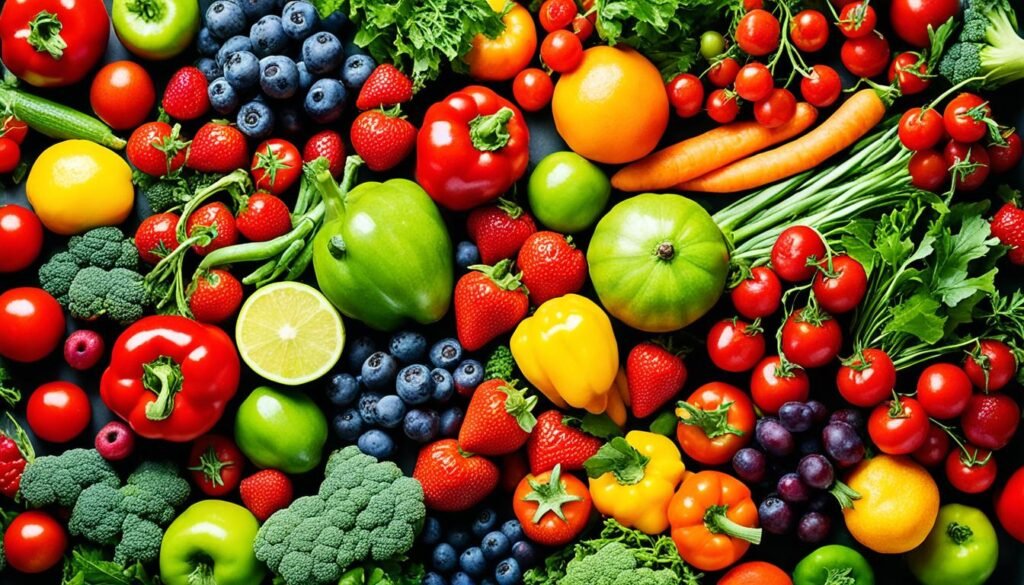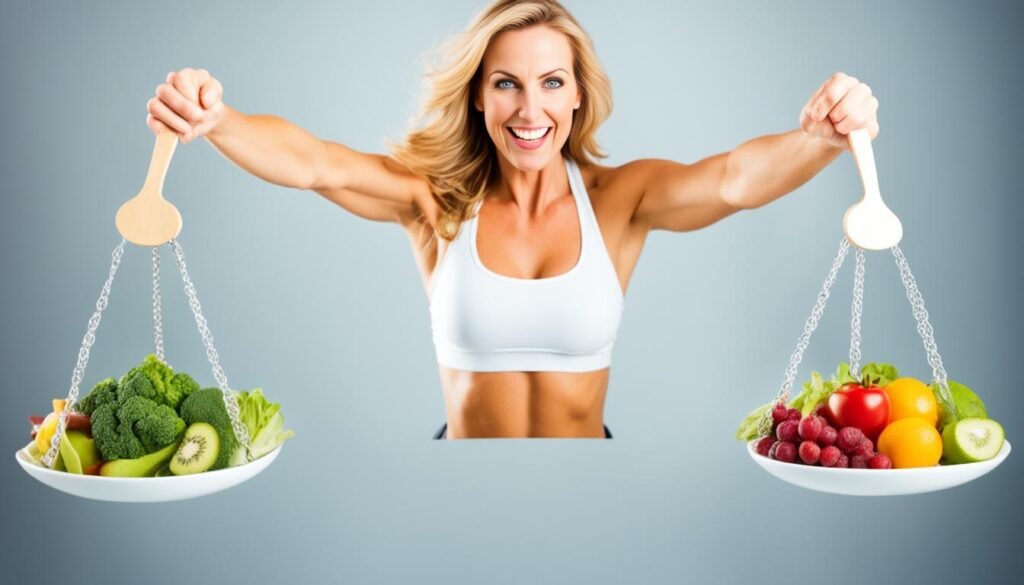Are you frustrated by diets that don’t last? Nutrition experts are here to help with habits that last a lifetime. We will share tips and tricks that are proven to work. They will change how you see food and exercise, helping you hit and keep your weight goals.
Key Takeaways:
- Turn your focus to changes that last to keep off the weight.
- Aim for the first 5-10% of weight loss for big health wins.
- Cut down on sugary carbs to fight off the snack temptations.
- Get more of your diet from healthy plant sources.
- Choose meals high in protein to keep full and raise metabolism.
There’s no magic way to lose weight for everyone. It’s about finding what works for you. Mixing the best in nutrition, workout plans, and healthy habits makes a big difference. This approach, guided by Nutritionist Tips, creates a route that fits your personal life and health goals perfectly.
Implement Long-Term Lifestyle and Behavior Changes
True weight loss isn’t fast or temporary. It needs ongoing changes to how you live and act. Making these changes part of everything you do is the real secret. Kyra Williams, a top dietitian, says focusing on feeling good and healthy is much more important than just shedding pounds.
Set SMART Goals and Reward Yourself
Begin with setting SMART goals for your weight loss journey. Think through what you really want and can achieve. Make these goals specific to you and your likes. And don’t forget to celebrate your wins. This keeps you going strong.
Focus on Self-Care, Not Just Weight Loss
Stop just thinking about losing weight. Start caring for yourself all over. Eat right, stay active, and manage stress. This way, you’re taking care of your whole self, not just aiming to be lighter. This helps you stay on track for life.
| Behavior Change Stage | Key Characteristics | Success Rate |
|---|---|---|
| Contemplation | Motivated to start changing habits, expecting health/energy improvements | 70% have specific goals |
| Preparation | Making behavioral changes in the last 6 months | Over 60% actively changing |
| Action | Dealing with setbacks but progressing forward | 85% maintained changes >6 months |
| Maintenance | Prioritize health, energy, and role modeling as pros of changes | 75% cite more energy, better health |
Working on lifestyle changes and habits is how you reach and keep weight loss success. It’s key to remember this change doesn’t happen overnight. Stay positive and cheer for every small victory. They all add up in the end.
Focus on the First 5% to 10% Weight Loss
Losing a small portion of your weight can do wonders for your health. It lowers risks of diabetes, stroke, and heart disease. These are the findings of Kristin Bennett, a registered dietitian.
A slow and steady weight loss is the best way to keep it off long term. She advises aiming for a 5-10% drop at first. You’ll see big health benefits without feeling like it’s too much. This approach is a great first step to reach your fitness and wellness goals.
Losing 5-10% of Your Body Weight Can Improve Your Health
Research shows dropping a small part of your body weight is very healthy. By losing 5-10%, you could see big improvements in your health. Such benefits include:
- Less risk of type 2 diabetes
- Lower chances of a stroke or heart disease
- Reduced risk for some cancers
- Better blood pressure and cholesterol
- More easy movement and less joint pain
- More energy and feeling better overall
It’s not just about the numbers on the scale. Celebrate the good changes in your health from modest weight loss. Taking a steady and balanced path can lead you to your fitness dreams.
“Losing 5-10% of your total body weight can significantly improve your health and lower your risk for a variety of chronic conditions.”
Starting slow and staying patient is key to reaching your weight goals. Keep your focus on being healthy overall. With time and hard work, you’ll see great changes.
Reduce Intake of Ultra-Processed Carbs and Sweets
The food you eat matters a lot for losing weight. High-glycemic, ultra-processed carbs and sugars, like in snacks and sweet drinks, slow this down. JAMA research shows that cutting these out helps you shed the pounds faster.
Men should keep their daily added sugar below 36 grams, while women should aim for less than 25 grams. But, many processed foods have way more sugar than that. This leads to weight gain and health problems.
Ultra-processed foods are easy to spot. If something has five or more ingredients, it’s likely one of them. These foods often contain things not used in home cooking, like bad fats and too much sugar. They can cause various illnesses.
Eating too many ultra-processed foods ramps up the odds of getting fat, sick, or even cancer. They’re made to look like real food but are full of harmful additives. So, cooking at home and picking whole foods safeguards your health and reduces the risk.
| Ultra-Processed Foods | Minimally Processed Foods |
|---|---|
| Snacks, desserts, sweetened beverages | Fruits, vegetables, meat, poultry, fish, eggs, chickpeas, lentils, whole grains |
| High in Added Sugars, Processed Carbohydrates, and unhealthy additives | Rich in nutrients, fiber, and other beneficial compounds |
| Linked to weight gain, heart disease, and cancer | Supports overall health and weight management |
To lose weight well and stay healthy, cut down on ultra-processed carbs and sugars. Focus on whole foods like fruits, vegetables, and grains. These changes make a big difference to your health.
Eat More Plants
Kyra Albertson, a registered dietitian, tells us to eat more fruits and vegetables for losing weight. These foods are full of fiber and water. They make you feel full without many calories. A study in Brazil showed eating more of these foods leads to better weight loss.
Albertson suggests 5-9 servings of produce each day. Adding more plant-based meals to your diet is good. Research says these meals are better for losing weight than eating fewer calories.
Aim for 5-9 Servings of Fruits and Vegetables Per Day
To aim for more plant-based foods can help with weight loss. Here are some ideas:
- Start your day with a nutrient-dense smoothie packed with fruits and greens.
- For snacks, choose fresh fruits, veggies, and some nuts or seeds.
- At meal times, have your plate half full of colorful cooked vegetables.
- Choose plant-based proteins like beans, lentils, or tofu. Eat them with your veggies to stay full.
- Try out new plant-based recipes, like pasta made from vegetables or bowls with grains.
Plant-Based Diets Promote Weight Loss and Are Easier to Stick To
Many studies prove that plant-based diets are great for losing weight. They focus on nutrient-dense foods like fruits, vegetables, whole grains, and legumes. These foods are high in fiber and low in calories. They help you feel full and happy, making it easier to follow your health goals.

“Eating more fruits and vegetables is key for health and weight control. These plant-based foods offer important nutrients, fiber, and water. They keep you full and lively.”
– Kyra Albertson, Registered Dietitian
Pump Up Your Protein
Protein is great for losing weight. It makes you feel full, keeps your muscles strong, and can help manage your weight. Dietitian Kyra Albertson says 25-30 grams of protein per meal is a good goal. This helps you feel full and keeps your diet balanced.
As women get older, especially around menopause, they need more protein. Albertson says women over 50 should aim for 1-1.5 grams of protein for each kilogram they weigh. This helps keep their muscles strong. It’s key for older adults looking to lose weight healthily and keep their muscles.
Protein-Rich Food Sources
- Greek yogurt (18g protein per serving)
- Nuts like almonds or walnuts (3.5-6g protein per serving)
- Beans (15g protein per cup)
- Quinoa (8g protein per cup)
- Eggs (6g protein per large egg)
- Peanut butter with banana (8g protein)
- Seeds like hemp, chia, or flaxseed (3.5-6g protein per serving)
- Peas (8g protein per cup)
- Edamame (9g protein per half cup)
Adding these protein-packed foods to your meals and snacks is smart. It helps you feel full, keeps your muscles, and balances your diet. This way, you can lose weight and keep it off steadily.
“It’s recommended to consume at least 20 to 30 grams of protein every three hours to help manage hunger and maintain muscle mass.”
Drink More Water
Drinking enough water is a key part of losing weight. Experts agree it’s vital for many reasons, from helping you eat less to boosting how your body burns energy. So, keep that water bottle close to increase your hydration and water intake.
Follow the 8×8 Rule
The “8×8 rule” suggests eight 8-ounce glasses of water daily. This basic advice is great for staying hydrated. Men should aim for about 125 ounces (3,700 ml) and women for 90 ounces (2,700 ml) to stay healthy.
Drink Water Before Meals
Studies show drinking water before eating helps with weight loss. Having two cups of water before your meal helps you eat less by making you feel full. It also supports your body’s ability to burn fat effectively.
“Drinking water before meals can be a simple yet powerful tool for weight management. It helps you feel fuller, which can lead to consuming fewer calories during the meal.”
– Angela Lemond, Registered Dietitian-Nutritionist
- Aim for 125 ounces (3,700 ml) if you’re a man, and 90 ounces (2,700 ml) if you’re a woman, per day.
- Be careful with sugary drinks like soda; they’re tied to obesity and poor health.
- H2O before meals can help you eat less by making you feel full and stopping cravings.

Remember, water is your friend when trying to shed pounds. It aids in everything from lowering how much you eat to keeping your metabolism in check. So, drink up for easier and longer-lasting weight loss success.
Eat a Well-Rounded Breakfast
Skipping breakfast might mess up your weight loss plans. But, dietitian Lainey Younkin thinks eating a balanced breakfast is key. Include protein, healthy fats, and fiber. Such a meal boosts your energy, keeps you full, and stops those mid-morning hunger pangs.
If you have eggs and toast for breakfast, you feel less hungry than if you eat bran cereal. That’s because eggs and toast have more protein, 25 grams, compared to 11 grams in the cereal.
Here are some good breakfast choices:
- Greek yogurt: One cup has 25 grams of protein and only 149 calories.
- Oatmeal: Provides about 10 grams of protein, plus iron, B vitamins, and fiber.
- Chia pudding: Chia seeds are fiber-rich and help you feel full with nearly 10 grams of fiber per ounce.
- Cottage cheese: It has 24 grams of protein per cup, making it a filling choice.
- Whole-grain toast: In 2 slices, you get 8 grams of fiber and 10 grams of protein, balancing your meal.
- Nuts and seeds: A small handful offers magnesium, potassium, and good fats to kick off your day.
Adding a cup of green tea to your breakfast can boost caffeine. This, along with its antioxidant benefits, is good for your brain.
Going for a balanced Breakfast is crucial. It includes Macronutrient Balance and Nutrient Density. It helps you lose weight and stay on track with eating times.
Stand Up and Move More
Want to up your physical activity without hitting the gym? Simple changes can make a big difference. Try standing more, use the stairs, and move your feet while sitting. This adds up your Non-Exercise Activity Thermogenesis (NEAT).
Increase Non-Exercise Activity Thermogenesis (NEAT)
Studies prove that swapping sitting with standing can burn 280 extra calories daily. Over time, this can lead to notable weight loss. Activities like walking, tidying up, and fidgeting help burn more calories and keep you moving all day.
“Simple changes like standing instead of sitting, taking the stairs instead of the elevator, and fidgeting or tapping your feet can make a big difference in your daily physical activity and calorie burn.”

- Exchange sitting for standing when you can.
- Prefer the stairs over elevators.
- Fidget, foot tap, or walk around while you’re on the phone.
- Take short walks during the day.
- Do easy exercises like lifting your legs or circling your arms while seated.
By adding more NEAT activities into your day, you’ll boost physical activity and calorie burn. This supports your weight loss journey in an easy, lasting way.
Nutritionist Tips: Hit the Weights
Want to lose weight? Dietitian Kyra Albertson says adding muscle is key. Muscle burns more calories at rest than fat does. This boosts your metabolism.
Focusing on resistance training helps. 2-3 sessions each week can build muscle. The high calorie burn from strength workouts keeps working for you.
Strength Training Boosts Metabolism
Strength training builds muscle and lifts your metabolism. This means you burn more calories daily. It’s a great way to aid weight loss.
Focus on Recovery for Best Results
Exercise is vital, but so is recovery, says Albertson. Too much training can slow your progress. Listen to your body. Rest, good diet, and managing stress help with recovery and muscle growth.
A balanced plan is crucial for lasting weight loss. Combining strength training, cardio, and a good diet works. Don’t forget the value of rest and recovery. They’re vital for meeting your fitness goals.
“Strength training builds muscle, which burns more calories, even at rest. Focus on recovery as well as exercise for best results.”
Don’t Go Overboard
When trying to lose weight, it’s tempting to go all out. But personal trainer Rob Darnbrough says extreme diet and exercise can be counterproductive. This can lead to overtraining and see your results dwindle over time.
Darnbrough believes the secret is finding a balance between stress and rest. The time your body spends recovering is as important as the effort you put into your workouts. Too much exercise or eating too little can strain your body. This strain might slow your recovery and cause problems you didn’t plan for.
Avoid Overtraining and Burnout
Instead of risking burnout, focus on changes you can stick with. This means:
- Setting SMART goals and giving yourself a pat on the back when you reach them.
- Taking better care of yourself and not just obsessing over your weight.
- Adding regular exercise and good nutrition to your life.
By striking the right balance between effort and relaxation, your weight loss can last. Plus, you’ll keep yourself healthy for the long haul.

Check in With an Accountability Partner
Starting a weight loss journey might feel lonely and hard. That’s why Jessica Levinson, a dietitian, stresses the value of an accountability partner. Someone who’s there to push you. Accountability and social support help a lot in keeping motivated to lose weight and keep it off.
Joining online weight loss programs with a friend leads to better results. People lost more weight and inches around their waists than those working alone. For example, the GOLO for Life Plan has seen members losing 1-2 pounds every week when partnering with a supportive friend or family member.
Regular communication is key in any accountability partnership. Setting daily, weekly, or regular check-ins will help you both stay focused. It’s crucial to have someone to cheer your wins and help tackle obstacles along the way.
- Find an accountability partner who will be honest, supportive, and not afraid to give you a gentle push when needed.
- Establish clear goals and expectations for your partnership, and hold each other accountable to them.
- Encourage each other to make healthy choices, share progress updates, and provide a listening ear when things get tough.
- Remember, your accountability partner is not a replacement for professional help in nutrition, fitness, or mental health, but a valuable source of encouragement and motivation.
With the right social support and embracing accountability, reaching your weight loss goals is possible. It’s about creating a lifestyle with healthy habits that lasts.
Conclusion
This guide has given you lots of tips from top dietitian-nutritionists for good and lasting weight loss. It’s all about long-term changes in lifestyle, eating well, and doing the right exercises. This way, you can lose weight and get healthier and happier overall.
Think of managing your weight as caring for yourself over time, not a quick solution. By using the advice in this article, you’ll be able to make changes that last. You’ll follow a plan that includes expert nutrition advice and a lifestyle that helps you. This will lead to a better way of looking at food and yourself, which makes life better.
Long-lasting weight loss isn’t about giving up things or hoping for too much. It focuses on your health and whole life. By making small changes and being happy about the little wins, you can start your journey to being healthier. It might be hard sometimes, but the right attitude and support can make it a real change for you.

